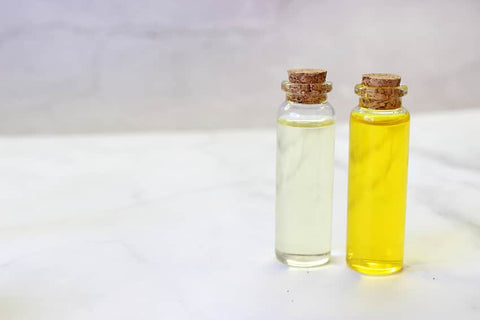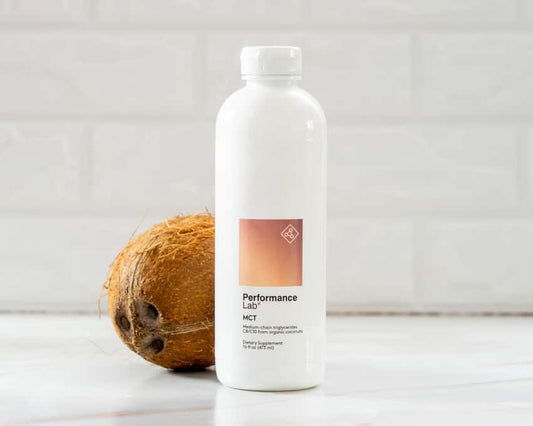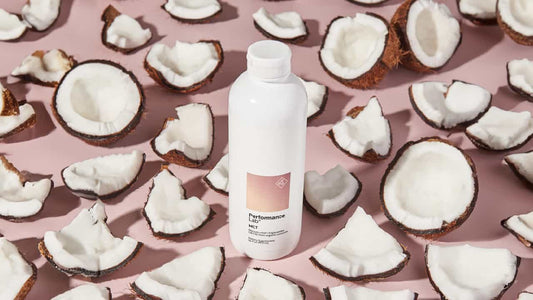Not that long ago, olive oil used to be all the rage.
But it’s taken a backseat as coconut oil stepped up to the plate to shine, and now everything you hear is coconut oil this, coconut oil that… miracle fat much?
Do a quick internet search on the benefits of coconut oil, and you’ll return thousands of results and studies about its ability to increase calorie burn, ward off fat gain, and everything else under the sun related to weight loss and fat burn.
Oh, and also its antibacterial and antiviral properties, making it yet another great immune booster.
Naturally, it seems logical to expect that it would earn a place in any bodybuilder’s diet.
So, what’s the deal with this so-called superfood? Is coconut oil actually that much better than other oils to burn calories and help you reach your weight loss goals?
We’re putting coconut oil and olive oil to the test to see who can claim the top spot.
The Specs: Coconut Oil vs Olive Oil
They’re two of the most widely used oils among people in the health and fitness community, but when it comes to maximizing muscle growth and accelerating recovery, which one is better?
Benefits Of Coconut Oil
There’s no shortage of information available on the benefits of coconut oil, in particular a type of fat called medium-chain triglycerides (MCTs), which comprises over 60% of the fats in coconut oil.
Because they’re metabolized differently than other fats—they’re rarely stored and are absorbed intact directly from the intestine—they have a preferential role in energy production.
Basically, they can provide quick energy in the same way as carbs do, without the massive blood sugar fluctuations you’d get from something like white rice or bread.
This unique bioavailability puts MCTs on the radar for bodybuilders looking to maximize fat loss during their cutting phase because they need to maintain proper energy levels but aren’t too keen on putting on excess fat.
Heard of MCTs before? We thought so. But here’s why the bodybuilding world (and virtually everyone else) is loving them.
- Boost energy expenditure (i.e., they burn calories)—There’s some truth behind the idea that coconut oil helps increase metabolism and burn more calories than other fats. That’s because of a process called diet-induced thermogenesis—the natural generation of heat resulting from consuming certain foods. Remember, coconut oil isn’t a calorie-free fat. While it may be effective at temporarily boosting energy expenditure, it’s not going to melt the fat away magically. However, compared with olive oil, daily consumption of 20g MCT in overweight participants resulted in lower body weight compared to the same amount of olive oil 1.
- Increases energy—If you’re looking for a quick boost of energy to power you through your training session but can’t afford the carb splurge, coconut oil seems like a shoo-in. Being composed primarily of MCTs, most of the fats in coconut oil are absorbed directly into portal circulation and sent to the liver for energy. Compared to long-chain triglycerides, like those found in olive oil, they skip the entire chylomicron-packaging and lymphatic process, making them much more efficient for immediate energy. Learn more about when you should consider taking mct oil pre or post workout.
- Regulates appetite—Kicked carbs to the curb on your cut, and now you’re craving everything in sight? It happens, but for times like those, coconut oil comes in handy. It’s traditionally been thought that the MCTs found in coconut oil help to regulate gut hormones, but its ability to keep your hanger in check may actually be because of its thermogenic and high satiety properties, which help to reduce energy intake 2. And its role in enhancing insulin sensitivity may also play a part in blood sugar management; balanced blood sugar means fewer fluctuations and fewer cravings.
- It’s rarely stored as fat—Because too much fat intake can cause an increase in fat storage, there’s a fine line between eating too much and not eating any at all. Bodybuilding is notorious for cutting carbs and fat in an effort to lean out. But clearly, they haven’t heard about MCT. Because MCTs are oxidized so rapidly in mitochondria for energy, there’s not really much of an opportunity for deposition in adipose tissue 3, which means coconut can still be part of your cutting diet with concern of packing on fat. However, keep in mind that coconut oil itself is less likely to be stored as fat, but it isn’t going to work magic on a bad diet.
Benefits Of Olive Oil
Unlike its fat-burning friend over there, olive oil is touted for its richness in healthy fats, specifically monounsaturated fat that has been linked to improved health outcomes for decades.
But something that many people don’t know (and bodybuilders may have the upper hand here) is that olive oil is actually rich in antioxidants and anti-inflammatory compounds that make it a good contender in a bodybuilder’s diet.
Olive oil contains relatively high concentrations of several nutrients—tocopherols (vitamin E), β-carotene, and phenolic compounds 4—that all contribute to its benefits.
These anti-inflammatory and antioxidant properties are exactly what may give bodybuilders a unique advantage when it comes to building muscle, preventing or repairing injuries, and speeding up recovery.
We’re all pretty familiar with the extent of muscle damage that happens when you’re trying to maximize muscle growth, so those repair compounds are key to your body’s ability to grow and recover.
The anti-inflammatory effects are mediated mainly by the antioxidants in olive oil, among them oleocanthal, which has been shown to work similarly to ibuprofen 5, a common anti-inflammatory drug and pain killer.
But in terms of its antioxidant capacity, olive oil shows a potential role in mitigating the extent of damage incurred by free-radicals.
It’s well known that exhaustive physical exercise generates free-radicals, as evidenced by an increase in plasma concentrations of various markers of oxidative damage, but studies show that increased intake of specific vitamins, namely vitamin C and E, can help to attenuate damage to some degree 6.
And olive oil? It doesn’t contain vitamin C, but it does contain tocopherols (vitamin E) and other free-radical-fighting compounds.
Which One’s Better?
Comparing coconut oil and olive oil is kind of like comparing pasta and apples. They’re both food, but when it comes to their use, they’re totally different.
With coconut and olive oil, some properties may overlap slightly, but the main reason people love them is entirely different, which means when comparing them, the scale will tip in favor of what you’re looking for.
Want a healthy heart and less inflammation? Go for olive oil.Want to boost your energy and increase fat loss? Go for coconut.Want both? Combine them!
However, in terms of bodybuilding, the goals of the training style are likely to favor coconut oil because of the almighty MCTs.
Their potent thermogenic properties and low opportunity for fat storage make them a great helper in times where you still need the energy and calories, but you really can’t afford to run the risk of fat deposition.
But keep in mind that coconut oil still contains lauric acid, an MCT that has been shown to function more like a long-chain fatty acid. And remember, LCTs must go through the digestive process before being absorbed, making them a bit more likely to be shunted towards fat storage.
So, if you want to drop that risk and bypass the potential for fat storage, opting for a pure MCT like Performance Lab MCT is probably the best bet.
You’re getting an ultra-clean coconut-derived product containing only C8 and C10 carbons that are used immediately for energy production and fat loss rather than other activities.
How To Use Coconut Oil
If you’re using seed or vegetable oils, let’s first make it clear that those need to go. They're contributing very little other than inflammation and damage, so dump ’em, toss ’em, or whatever you want to do, as long as they leave and never return.
From here out, it’s a simple swap.
There’s really no end to what you can do with coconut oil. While the solidification of it may be less than ideal if you’re wanting to just drizzle it over some veggies, it works as the perfect sub for any other fat you’d normally use. Sauces, marinades, shakes, smoothies, on a spoon… the list goes on.
Final Thoughts
MCT and coconut oil basically take the crown when it comes to fats and oils, and they’re becoming one of the best companions for bodybuilders, athletes, and really anyone looking to lose a few pounds.
But like any other fat, you want to be careful adding in too much, especially with MCT due to its effect on GI function (it acts like a laxative in high doses), and realistically nobody wants to be dealing with that in the middle of a workout.
References
- MP St-Onge, A Bosarge. Weight-loss diet that includes consumption of medium-chain triacylglycerol oil leads to a greater rate of weight and fat mass loss than does olive oil. Am J Clin Nutr. 2008;87(3):621-626.
- MP St-Onge, B Mayrsohn, M O'Keeffe, HR Kissileff, AR Choudhury, B Laferrère. Impact of medium and long chain triglycerides consumption on appetite and food intake in overweight men. Eur J Clin Nutr. 2014;68(10):1134-1140.
- MP St-Onge. Dietary fats, teas, dairy, and nuts: potential functional foods for weight control? Am J Clin Nutr. 2005;81(1):7-15.
- B Lanza, P Ninfali. Antioxidants in Extra Virgin Olive Oil and Table Olives: Connections between Agriculture and Processing for Health Choices. Antioxidants (Basel). 2020;9(1):41.
- L Lucas, A Russell, R Keast. Molecular mechanisms of inflammation. Anti-inflammatory benefits of virgin olive oil and the phenolic compound oleocanthal. Curr Pharm Des. 2011;17(8):754-768.
- J Viña, MC Gomez-Cabrera, A Lloret, et al. Free radicals in exhaustive physical exercise: mechanism of production, and protection by antioxidants. IUBMB Life. 2000;50(4-5):271-277.















